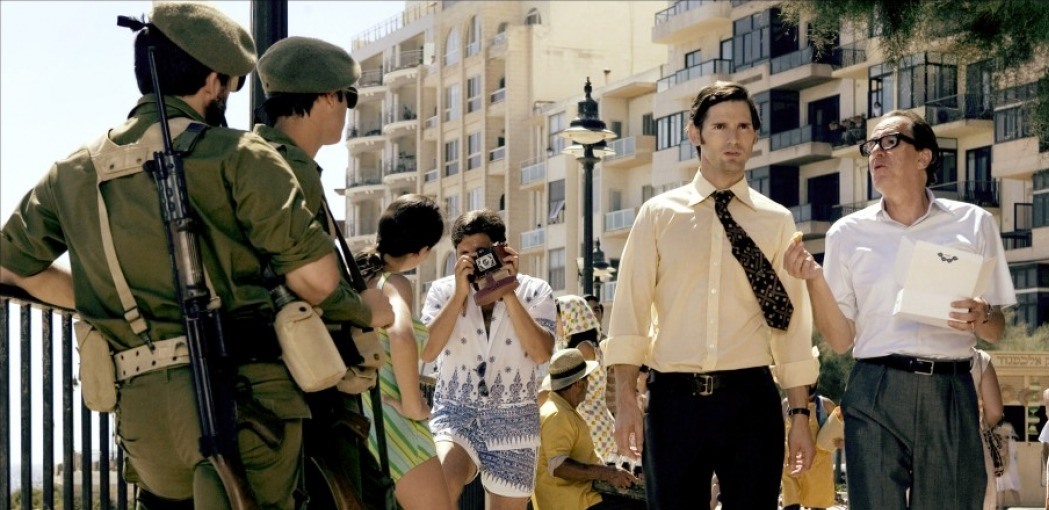← Back to Reviews
in
#705 - Munich
Steven Spielberg, 2005

Based on the true story of a team of international Jewish operatives who join forces in order to assassinate the group of Palestinians responsible for orchestrating a massacre at the Munich Olympics.
I'm still a bit hesitant to call Steven Spielberg one of my favourite directors, though I don't entirely buy into the idea that he is just a really popular hack whose serious films lack depth. Munich is another example of such a film in that it is based on yet another story that could have played its protagonist's struggle as an unambiguous conflict with clearly-defined villains to defeat but instead opts to try for something more complex in the process. The protagonist here is Eric Bana as a Mossad agent who is sent on a secret mission with a handful of Jewish operatives from around the world in order to target the Arabic terrorists responsible for organising the execution of eleven Israeli athletes during the 1972 Munich Olympics. While Bana's initial development is pretty straightforward - he is a loving husband and expectant father who is willing to do right by his country - that soon gives way as his decidedly more dedicated handler (Geoffrey Rush) orders him to feign resignation so he can go undercover with the rest of his anti-terrorist cell. Once he's working with his fellow operatives, things gradually become more and more tense as their attempts to take out their targets are fraught with many difficulties.
Munich has just about all the hallmarks of late-period Spielberg as he opts for a quasi-documentarian approach, carefully teasing out snippets showing what happened to the murdered athletes amidst the tale of the men assigned to take revenge. There are a number of other factors in play such as an air of paranoia not unlike those from actual thrillers of the film's era, to say nothing of the ways in which this seemingly justified revenge mission ends up proving not only difficult from a logistical standpoint but also from a moral one as various circumstances (such as a prospective victim's young daughter being a potential victim for a trap) serve to poke holes in the apparent righteousness of our protagonists' squad. Unfortunately, one of those hallmarks ends up being that it's probably a bit too long for its own good - there are moments that could have used a little tightening, especially towards the end. Otherwise, Munich proves a rather solid (if not exactly great) film. It has the same sort of moral ambiguity that has persisted throughout a few of Spielberg's more serious films (I could spot similarities to this year's Bridge of Spies, though that film was ever-so-slightly more cut-and-dried in its approach and content) and, at the very least, it's a serviceable thriller that doesn't get too bogged down in talkative drama for its own good.
Steven Spielberg, 2005

Based on the true story of a team of international Jewish operatives who join forces in order to assassinate the group of Palestinians responsible for orchestrating a massacre at the Munich Olympics.
I'm still a bit hesitant to call Steven Spielberg one of my favourite directors, though I don't entirely buy into the idea that he is just a really popular hack whose serious films lack depth. Munich is another example of such a film in that it is based on yet another story that could have played its protagonist's struggle as an unambiguous conflict with clearly-defined villains to defeat but instead opts to try for something more complex in the process. The protagonist here is Eric Bana as a Mossad agent who is sent on a secret mission with a handful of Jewish operatives from around the world in order to target the Arabic terrorists responsible for organising the execution of eleven Israeli athletes during the 1972 Munich Olympics. While Bana's initial development is pretty straightforward - he is a loving husband and expectant father who is willing to do right by his country - that soon gives way as his decidedly more dedicated handler (Geoffrey Rush) orders him to feign resignation so he can go undercover with the rest of his anti-terrorist cell. Once he's working with his fellow operatives, things gradually become more and more tense as their attempts to take out their targets are fraught with many difficulties.
Munich has just about all the hallmarks of late-period Spielberg as he opts for a quasi-documentarian approach, carefully teasing out snippets showing what happened to the murdered athletes amidst the tale of the men assigned to take revenge. There are a number of other factors in play such as an air of paranoia not unlike those from actual thrillers of the film's era, to say nothing of the ways in which this seemingly justified revenge mission ends up proving not only difficult from a logistical standpoint but also from a moral one as various circumstances (such as a prospective victim's young daughter being a potential victim for a trap) serve to poke holes in the apparent righteousness of our protagonists' squad. Unfortunately, one of those hallmarks ends up being that it's probably a bit too long for its own good - there are moments that could have used a little tightening, especially towards the end. Otherwise, Munich proves a rather solid (if not exactly great) film. It has the same sort of moral ambiguity that has persisted throughout a few of Spielberg's more serious films (I could spot similarities to this year's Bridge of Spies, though that film was ever-so-slightly more cut-and-dried in its approach and content) and, at the very least, it's a serviceable thriller that doesn't get too bogged down in talkative drama for its own good.
